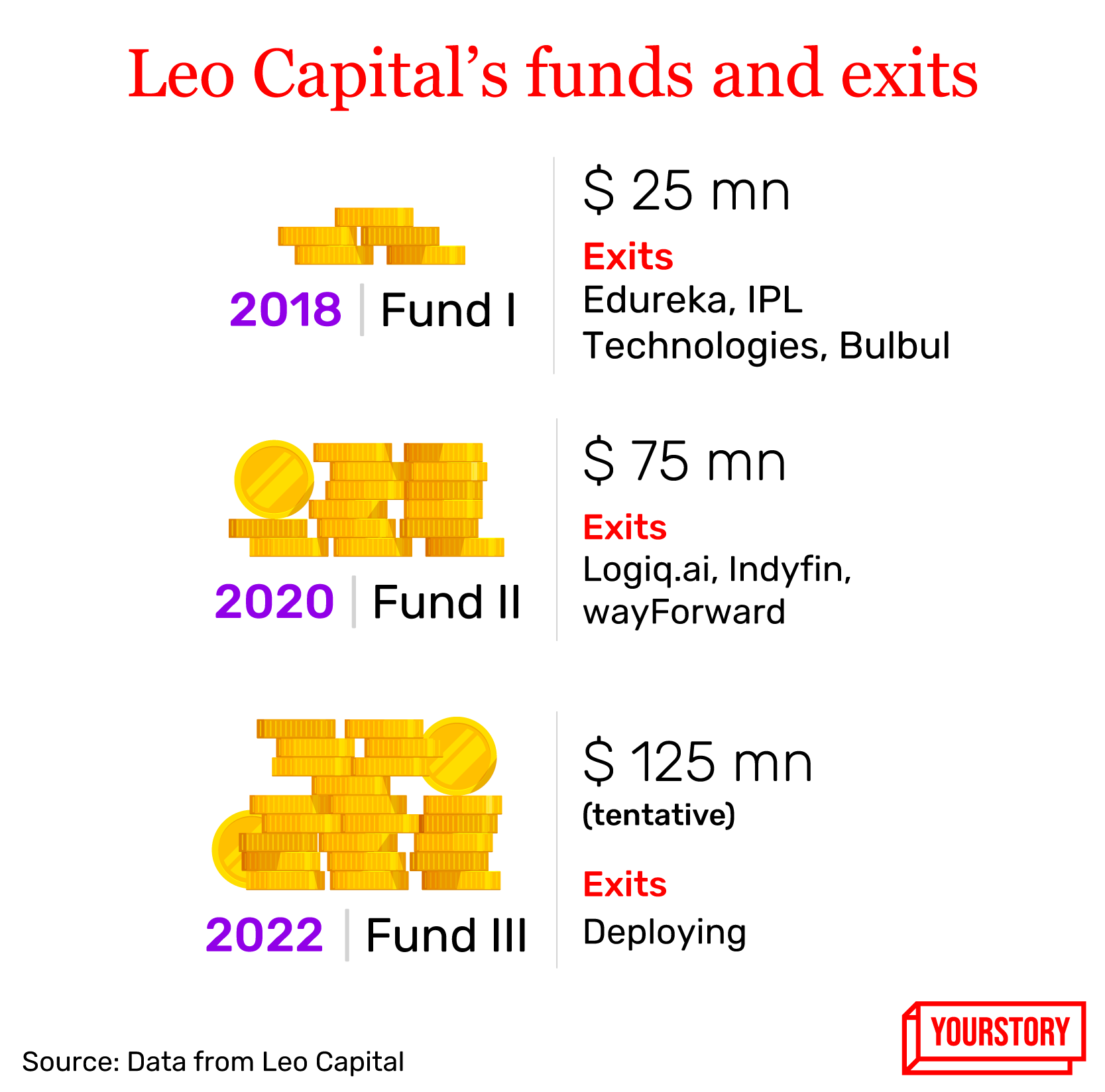
Early-stage venture capital firm is poised to record three exits during the ongoing quarter as it actively explores acquisition by strategics for some of its portfolio companies from its $75 million Fund II.
The firm has dialled up its exit pipeline over the last quarter as raising new funds become challenging in the ongoing funding winter, says Rajul Garg, Founder and Managing Partner at Leo Capital.
“We look at companies where they have to raise capital in the next six to nine months to survive. That is a tenuous situation given the market, so we are actively looking at potential strategics for sale of these companies,” Garg tells YourStory.
The firm has already seen three exits from Fund II including the acquisition of healthtech startup wayForward by DarioHealth, Software-as-a-Service (SaaS) company Logiq by Swedish company Apica and the acquisition of fintech startup Indyfin by WiserAdvisor recently. Another SaaS exit is in the works, adds Garg.
The firm has seen two exits from Fund I, including Edureka and IPL Tech through public transactions, though the recent exits are skewed towards exit to strategic players owing to the paucity of growth rounds.
<figure class="image embed" contenteditable="false" data-id="525838" data-url="https://images.yourstory.com/cs/2/bc14afb0357911eca2270b39b804102d/LeoCapital-04-1694520707593.png" data-alt="Leo Capital Exit" data-caption="
Exits by Leo Capital (Graphic: Winona Laisram)
” align=”center”> Exits by Leo Capital (Graphic: Winona Laisram)
Founded in 2018 and headquartered in Delhi, Leo Capital has been finding it challenging to close its $125 million Fund III. It had announced first close in September 2022, and since has been struggling to close the fund due to delayed deployment from Limited Partners (LPs) owing to prevailing market conditions.
“We hope to achieve a final close by the end of the year. It has been a challenging fundraising environment, and the fund has taken longer than we thought,” says Garg. However, this will not impact the deployment of capital from the Singapore-registered third fund, he adds.
“As a fund manager, it doesn’t dramatically alter our deployment strategy. It will impact the total number of deployments. With $125 million, we plan to invest in 28 to 30 startups, and if we fall short, it will be two or three companies less,” says Garg.
He adds that the new fund will also attract a greater number of institutional investors than previous funds. Nearly two-thirds of the capital in the new fund will come from institutional LPs, with the rest coming in from family offices, says Garg, adding that this is a conscious departure from the nearly equal mix for the $75 million Fund II.
Leo Capital, which writes cheques between $500,000 to up to $5 million at the seed and pre-Series A stages, has already started deploying capital from the third fund. It has backed data analytics platform MakerDojo.io in October 2022, WhatsApp commerce solution provider QuickReply.ai in April 2023, and simulated stock market gaming app Trading Leagues in June 2023, among other undisclosed investments, across eight startups.
Garg adds that the average valuation in early-stage startups has gone back to the 2019-2020 vintage, compared to the hyperfunding cycle of 2021.
“As a fund, we like to take significant minority equity in the vicinity of 15%. The current cheque sizes have gone down from the second fund,” he says.
Leo Capital broadly invests in digitisation of sectors in India and Software-as-a-Service (SaaS) being built out of India and South East Asia.
.thumbnailWrapper
width:6.62rem !important;
.alsoReadTitleImage
min-width: 81px !important;
min-height: 81px !important;
.alsoReadMainTitleText
font-size: 14px !important;
line-height: 20px !important;
.alsoReadHeadText
font-size: 24px !important;
line-height: 20px !important;

“Historically, we have played two themes of investment–one is domestic or India digitisation theme, across sectors like content, commerce, healthtech, and edtech. Second theme of investment has been SaaS built out of India,” Garg tells YourStory.
He says that the fund has backed more companies in the SaaS and deeptech space, as sectors like fintech, edtech, and business-to-business (B2B) commerce seem well-funded for now to make new bets.
Edited by Megha Reddy









![Read more about the article [Funding alert] BYJU’S is raising $150M from UBS](https://blog.digitalsevaa.com/wp-content/uploads/2021/04/Image4yw7-1619696385385-300x150.jpg)
